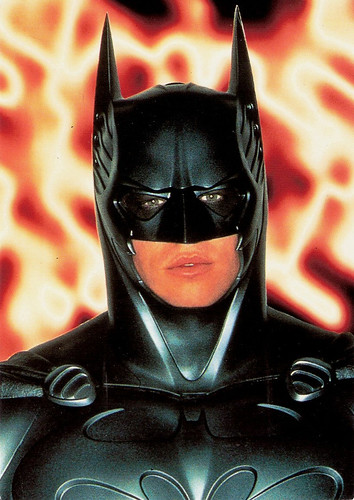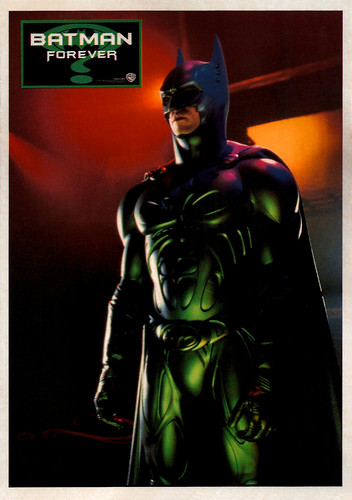
Belgian postcard by Boomerang Free Cards. Photo: Warner Bros. Val Kilmer in Batman Forever (Joel Schumacher, 1995).

Belgian postcard by Boomerang Free Cards. Photo: Warner Bros. Chris O'Donnell as Robin in Batman Forever (Joel Schumacher, 1995).

Belgian postcard by Boomerang Free Cards. Photo: Warner Bros. Nicole Kidman as Dr. Chase Meridian in Batman Forever (Joel Schumacher, 1995).

Belgian postcard by Boomerang Free Cards. Photo: Warner Bros. Tommy Lee Jones as Harvey Two-Face in Batman Forever (Joel Schumacher, 1995).

Belgian postcard by Boomerang Free Cards. Photo: Warner Bros. Jim Carrey as Riddler in Batman Forever (Joel Schumacher, 1995).
Sinking his teeth into the super-villain he was born to play
The plot of Batman Forever (Joel Schumacher, 1995) focuses on Batman (Val Kilmer) trying to stop a criminal known as Two-Face, formerly district attorney Harvey Dent, (Tommy Lee Jones) and the Riddler (Jim Carrey) in their villainous scheme to extract confidential information from all the minds in Gotham City and use it to learn Batman's identity and bring the city under their control.
The Riddler was formerly Edward Nygma, an eccentric researcher at Wayne Enterprises. Nygma approached his employer, Bruce Wayne (Batman's civilian identity), with an invention that can beam television signals directly into a person's brain. Bruce rejected the device, concerned the technology could manipulate minds. After killing his supervisor and staging it as a suicide, Nygma resigned and plots revenge against Bruce, sending him riddles.
While fighting Two-Face and The Riddler, Batman gains allegiance from a young, orphaned circus acrobat named Dick Grayson (Chris O'Donnell), who becomes his sidekick Robin. Batman also meets and develops feelings for psychologist Dr. Chase Meridian (Nicole Kidman), which brings him to the point to decide if he will lead a normal life or if he is destined to fight crime as Batman forever.
Director Joel Schumacher mostly eschewed the dark, dystopian atmosphere of Tim Burton's films by drawing inspiration from the Batman comic books of the Dick Sprang era, as well as the 1960s television series, but without the campiness of the later film. After Michael Keaton chose not to reprise his role, William Baldwin and Ethan Hawke were considered as a replacement before Val Kilmer joined the cast.
The film was released on 16 June 1995. Batman Forever grossed over $336 million worldwide and became the sixth-highest-grossing film worldwide of 1995. The film received mixed reviews, with criticism directed towards the CGI, Kilmer's performance, costume designs, and tonal departure from previous films, but praising the visuals, action sequences, and performances of Carrey and Jones.
Derek Armstrong at AllMovie: "After two dark chapters that each explored new territory, arguably improving in quality and thematic juiciness with the feminist slant of Batman Returns, Batman Forever sorely misses the presence of Tim Burton and Michael Keaton, who jumped ship before the ideas dried up. It's much more a platform for Jim Carrey than the adequate but dull Val Kilmer, finally permitting Carrey to sink his teeth into the super-villain he was born to play, in turn granting him license to overact his heart out. But for all of Carrey's undeniable gusto, the performance doesn't come close to making the movie."
Roger Ebert at RogerEbert.com: "I liked the look of the movie and Schumacher's general irreverence toward the material. But the great Batman movie still remains to be made. Here is the most complex and intriguing of classic comic superheroes, inhabiting the most visually interesting world, but somehow a story hasn't been found to do him justice. A story - with a beginning, a middle, and an end, and a Batman at its center who emerges as more than a collection of costumes and postures. More than ever, after this third movie, I found myself asking, Who was that masked man, anyhow?"
Batman Forever (Joel Schumacher, 1995) was followed by Batman & Robin in 1997, with Schumacher again as the director. Although Val Kilmer enjoyed playing Batman his working relationship with director Joel Schumacher was poor. Kilmer openly refused to repeat the Bruce Wayne role, and he was succeeded by George Clooney. Chris O'Donnell did return as Robin.

British postcard by Slow Dazzle Worldwide, no 10 in a series of 16. Val Kilmer in Batman Forever (Joel Schumacher, 1995).

British postcard by Slow Dazzle Worldwide, no. 19 in a series of 16, no. 1621. Photo: DC Comics, 1995. Tommy Lee Jones as Harvey Two-Face in Batman Forever (Joel Schumacher, 1995). Caption: Half man, half madman, he's the ultimate dual personality. Two-Face is the former Gotham City district attorney Harvey Dent, who mistakenly blames Batman for an accident that left one side of his face grotesquely deformed. And now he's out to get Batman!

French postcard by Editions Mercuri, no. 1619. Photo: Warner Bros. Jim Carrey as Riddler in Batman Forever (Joel Schumacher, 1995).

French postcard by Editions Mercuri, no. 1620. Photo: Warner Bros. Val Kilmer in Batman Forever (Joel Schumacher, 1995).

French postcard by Editions Mercuri, no. 1621. Photo: Warner Bros. Nicole Kidman as Dr. Chase Meridian in Batman Forever (Joel Schumacher, 1995).
Sources: Derek Armstrong (AllMovie), Roger Ebert (RogerEbert.com), Wikipedia, and IMDb.
No comments:
Post a Comment